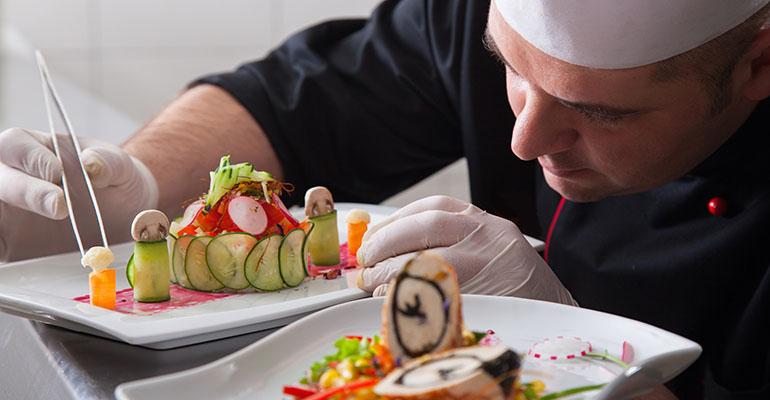Being a private chef: It’s an enticing prospect for many students graduating from culinary school or those working in a professional kitchen. But is it the right choice for you?
“The hardest hurdle to get over is the ability to balance being both the front of house and back of house at the same time,” says Aram Reed, chef and owner of Chef Aram Reed Private Dining in Chicago. “As a private chef, you shop, prep and execute dinners, but you also need to be a sales rep, c.e.o., admin and social media manager. It can be a struggle. I think the hardest thing is just keeping up with it all.”
Elle Green, owner of Chef Elle Green & Co. in Memphis, agrees. “Being a private chef is more than a title; it's a business,” she says. “Before ordering business cards and announcing it to your Facebook and Twitter friends, name your business and secure a business license.” Green says you’ll also want to purchase liability insurance, check with the health department in your area about rules of compliance and seek out commercial kitchens.
And just like any business, there are pros and cons to being a private chef, too. “You can be your own boss, travel the world and do something different every day,” says Chef J. Jackson, owner of Entree Metropolitan Catering in Washington DC. “However, there are also highs and lows for business; if you don’t work, no money is coming in; and there’s a ton of competition.”
Here are four elements to establishing yourself as a private chef:
1. Find and keep clients
When first starting out, Reed suggests creating your brand and starting to build a base network. Working at places where you can teach and be in front of those who may want to hire you later is a great way to get your foot in the door. “Handing out your business cards to prospects after class, and staying in touch, will help to grow your client base in the beginning,” says Reed. “After you find the clients, stay in touch and it will spread; 90 percent of all business is word of mouth.”
“Industry events are huge for getting your name out there; it gives you an opportunity to interact with your peers and even find a mentor,” says Jackson. “Social media engagement is another good way to break into the industry. Whether it’s Twitter, Instagram or Facebook, there’s a whole world out there ready to shout your praises, provide advice and steer you in the right direction.”
2. Know your audience
“With wildly popular food shows, even people with modest incomes call in a private chef from time to time,” says Green. “Target your attention to a specific segment, say, executives, and not midlevel managers, as this dictates menus and prices.”
“Being a private chef is personal; you’re in someone’s house asking them to relinquish their kitchen,” says Reed. “You’re essentially a showman, so you need to have the ability to be funny and tell stories.”
“Take advantage of opportunities that allow you to spotlight the benefits of having a private chef,” Green adds. “Know your food sources and be flexible to make menu changes. With mounting food allergies and sensitivities, this is vitally important.”
3. Keep it simple
As your own boss, you’ll be in charge of purchasing all of the food as well, so budgets will become very important very quickly. “Have recipes that don't require a laundry list of ingredients and a lot of time so you're not scrambling at the last minute,” says Green. “Since you may not be booked the entire month, budget your expenses accordingly. If your client needs you to travel or do a job on short notice, accept the job, but keep the menu simple, with emphasis on the dessert, seeing how it's the last dish you're presenting.”
4. Market yourself
“You're a private chef, so wear your chef's jacket everywhere! Somebody is bound to strike up a conversation,” says Green. “Keep business cards on you. Make friends with the media. Send goodies to the newsrooms and radio stations, especially when it's raining. It's also not a bad idea to get to know some of the owners of wine and spirit shops in your area.”
Reed agrees, adding that he hands out his business cards at the local farmers markets, culinary demos and organic grocery stores. “Always carry your cards and let people know that you are a chef and do private events,” he says. “How you present yourself—from your communication, to the time you show up, throughout your presentation—needs to highlight your professionalism and impress your clients. I like to say that we show up with a handshake and leave with a hug. I want clients to feel like they’re part of the family.”
“Set yourself apart and deliver above and beyond expectations,” says Jackson. “Create value and show people why it’s of value. And always share your story. Why are you a chef? People love to hear food stories.”





